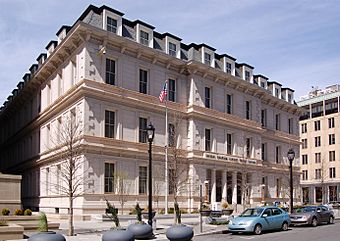Federal Building (Raleigh, North Carolina) facts for kids
Quick facts for kids |
|
|
Federal Building
|
|
 |
|
| Location | 300 Fayetteville St., Raleigh, North Carolina |
|---|---|
| Area | 0.5 acres (0.20 ha) |
| Built | 1874 |
| Architect | Alfred B. Mullet |
| Architectural style | Second Empire |
| Part of | Fayetteville Street Historic District |
| NRHP reference No. | 71000624 |
| Added to NRHP | May 6, 1971 |
The Federal Building, also known as the Century Post Office, is a very old and important building in Raleigh, North Carolina. You can find it on Fayetteville Street. This building was the very first big project the U.S. government built in the Southern states after the Civil War.
Construction of this special building started in 1874 and finished in 1878. It was designed in a style called Second Empire by a famous architect named Alfred B. Mullett. He also designed the Old Executive Office Building near the White House. The Federal Building was added to the National Register of Historic Places in 1971. This means it's officially recognized as an important historical place. It's also a special landmark in Raleigh.
A Historic Start
When the Federal Building was finished, it housed many important government offices. For example, the post office was on the first floor. This is where people would send and receive mail.
Inside the Building
The second floor was home to the United States District Court. This is a type of court where important legal cases are heard. At the time, people said it was the best courtroom in all of North Carolina.
As Raleigh grew bigger, the building needed more space. So, in 1913, the Federal Building was made twice as large! Workers were careful to make the new parts look just like the old ones. They used the same materials and copied the original designs. Then, in 1939, the building was expanded again, keeping the same look on the outside.
Changes Over Time
After World War II, the U.S. government agencies grew very quickly. Because of this, many offices that were in the Federal Building moved to other places in Raleigh.
In 1970, a brand new Federal Building was built downtown. This new building brought many government offices together in one place. It also became the new home for the main court and post office operations.
The Century Station
In 1978, the original Federal Building was updated and given a new name: Century Station. This new name celebrated 100 years since the building first opened! Today, it still serves as a post office for downtown Raleigh. It also houses the United States Bankruptcy Court, which helps people and businesses with financial problems.
 | Delilah Pierce |
 | Gordon Parks |
 | Augusta Savage |
 | Charles Ethan Porter |



